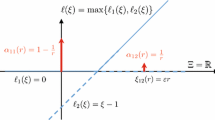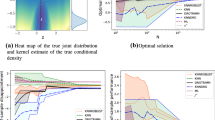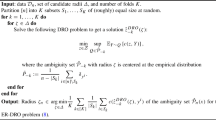Abstract
Conditional density estimation in a parametric regression setting, where the problem is to estimate a parametric density of the response given the predictor, is a classical and prominent topic in regression analysis. This article explores this problem in a nonparametric setting where no assumption about shape of an underlying conditional density is made. For the first time in the literature, it is proved that there exists a nonparametric data-driven estimator that matches performance of an oracle which: (i) knows the underlying conditional density, (ii) adapts to an unknown design of predictors, (iii) performs a dimension reduction if the response does not depend on the predictor, (iv) is minimax over a vast set of anisotropic bivariate function classes. All these results are established via an oracle inequality which is on par with ones known in the univariate density estimation literature. Further, the asymptotically optimal estimator is tested on an interesting actuarial example which explores a relationship between credit scoring and premium for basic auto-insurance for 54 undergraduate college students.
Similar content being viewed by others
References
Abramovich F., Sapatinis T. (1999) Bayesian approach to wavelet decomposition and shrinkage. Springer, New York
Arnold B.C., Castillo E., Sarabia J.M. (1999) Conditional specification of statistical models. Springer, New York
Efromovich S. (1985) Nonparametric estimation of a density with unknown smoothness. Theory of Probability and its Applications 30: 557–568
Efromovich S. (1999) Nonparametric curve estimation: methods, theory and applications. Springer, New York
Efromovich S. (2000) On sharp adaptive estimation of multivariate curves. Mathematical Methods of Statistics 9: 117–139
Efromovich S. (2005) Estimation of the density of regression errors. The Annals of Statistics 33: 2194–2227
Efromovich S. (2007) Conditional density estimation in a regression setting. The Annals of Statistics 33: 2504–2535
Eubank R.L. (1999) Nonparametric regression and spline smoothing. Marcel Dekker, New York
Fan J. (1992) Design-adaptive nonparametric regression. The Journal of American Statistical Association 87: 998–1004
Fan J., Gijbels I. (1996) Local polynomial modeling and its applications. Chapman and Hall, New York
Koul H., Sakhanenko L. (2005) Goodness-of-fit testing in regression: A finite sample comparison of bootstrap methodology and Khmaladze transformation. Statistics and Probability Letters 74: 290–302
Neter J., Kutner M., Nachtsheim C., Wasserman W. (1996) Applied linear models, 4th ed. McGraw-Hill, Boston
Prakasa Rao B.L.S. (1983) Nonparametric functional estimation. Academic Press, New York
Samarov A.M. (1992) Lower bound for the integral risk of density function estimates. Topics in Nonparametric Estimation 8: 1–7
Author information
Authors and Affiliations
Corresponding author
Additional information
Supported in part by NSF Grant DMS–0604558, NSA Grant 0710075, and Grant TAF/CAS-07.
About this article
Cite this article
Efromovich, S. Oracle inequality for conditional density estimation and an actuarial example. Ann Inst Stat Math 62, 249–275 (2010). https://doi.org/10.1007/s10463-008-0185-1
Received:
Revised:
Published:
Issue Date:
DOI: https://doi.org/10.1007/s10463-008-0185-1




